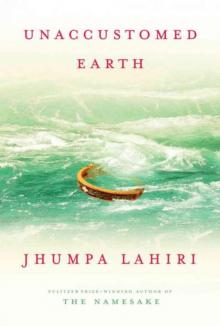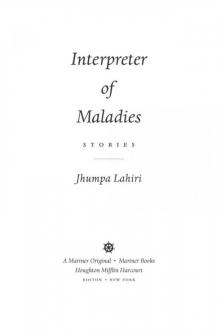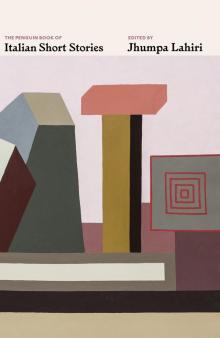- Home
- Jhumpa Lahiri
The Penguin Book of Italian Short Stories Page 6
The Penguin Book of Italian Short Stories Read online
Page 6
‘Your sort, always combining flavours! Sea urchins have to taste also like lemon, sugar also like chocolate, love also like paradise!’ When he finished he took a sip of wine and closed his eyes. After a bit I noticed, slipping from beneath his shriveled eyelids, two tears. He stood up and walked to the window, where he furtively dried his eyes. Then he turned. ‘Have you ever been to Augusta yourself, Corbera?’ I’d spent three months there as a recruit; during off-duty hours two or three of us would take a boat out on the transparent waters and explore the gulfs. After my answer he was silent; then, in an irritated voice: ‘And did you grunts ever arrive as far as the inland gulf past Punta Izzo, behind the hill overlooking the saltworks?’
‘We certainly did, it’s the most beautiful spot in Sicily, yet to be discovered, thankfully, by the Dopolavoro crowds.3 The coast is wild there, right, Senator? It’s completely deserted, and you can’t see a single house; the sea is the colour of peacocks; and behind it all, beyond the shifting waves, rises Mount Etna. From no other spot is it so beautiful – calm, powerful, truly divine. It’s a place where you can see the island in one of its eternal aspects, as it was before it so foolishly turned its back on its vocation, which was to serve as pasture for the Cattle of the Sun.’
The senator was silent. Then: ‘You’re a good kid, Corbera; if you weren’t so ignorant, something might have been made of you.’ He came toward me and kissed my forehead. ‘Now bring round your jalopy. I want to go home.’
In the weeks that followed we continued to see each other regularly. Now we also took late-night walks, generally down Via Po and across the martial expanse of Piazza Vittorio; we went to gaze at the rushing river and the Turin hills, elements that introduced a drop of fantasy into the geometrical rigour of the city. Then began the spring, that affecting season of threatened youth; the first lilacs sprouted on the banks, and the most impetuous of the young couples without a place to retreat to braved the dampness of the grass. ‘Down there the sun already blazes, the algae blooms, the fish appear at the surface of the water on moonlit nights and flashes of bodies can be made out between the lines of luminous foam. We stand here before this insipid, lifeless current of water, before these big ugly buildings that look like soldiers or monks all in a line, and we hear the sobs of these dying creatures coupling.’ It cheered him, however, to think about the impending voyage to Lisbon, not far off now. ‘It will be pleasant. You ought to come along as well. A shame that it’s not open to those deficient in Greek; with me at least you can speak Italian, but if Zuckmayer or Van der Voos found out you didn’t know the optative of every irregular verb, you’d be done for. This even though you may be more in touch with Greek reality than they are; not through cultivation, clearly, but through animal instinct.’
Two days prior to his departure for Genoa he told me that he would not be returning to the café the following day, but that he would expect me at his house at nine that evening.
The protocol was identical to the last time: The images of the gods of three thousand years ago radiated youth as a stove radiates heat; the faded photograph of the young god of fifty years ago seemed dismayed at watching his own metamorphosis into a white-haired old man sunk in an armchair.
When the Cypriot wine had been drunk the senator called Bettina and told her she could go to bed. ‘I will see Signor Corbera out myself when he goes.’ Then: ‘Believe me, Corbera, if I’ve asked you here this evening at the risk of upsetting any Rivoli fornication plans you might have had, it’s because I need you. I leave tomorrow, and when you go away at my age you never know if it won’t be necessary to stay away forever, especially when you go by sea. Please know that I genuinely care for you: Your ingenuousness touches me, your unconcealed carnal intrigues amuse me, and it seems to me that, as is sometimes the case with the best kind of Sicilians, you have managed to achieve a synthesis of the senses and reason. Therefore you deserve not to be left empty-handed, without hearing me explain the reason behind some of my eccentricities, of some sentences I’ve spoken in your presence that will certainly have appeared to you worthy of a madman.’
I protested weakly: ‘I haven’t understood many of the things you’ve said, but I’ve always attributed my incomprehension to the inadequacy of my own mind, never to an aberration of yours.’
‘Don’t worry, Corbera, it doesn’t matter. All of us old people seem crazy to you young people, and often in fact the opposite is true. To explain myself, however, I’ll have to tell you about my adventure, an uncommon one. It happened when I was “that young gentleman there,” and he pointed at his photograph. ‘I have to go back to 1887, a time that will seem prehistoric to you but is not for me.’
He moved from his place behind the desk and came to sit down beside me on the same couch. ‘Pardon me, but from now on I’ll have to speak in a low voice. Important words cannot be bellowed; the “cry of love” or hate is to be found only in melodrama or among the most uncultivated people, which comes to the same thing in the end. In 1887, then, I was twenty-four years old; I looked like the person in that photograph. I already had my degree in ancient literature and had published two articles on Ionic dialects that had caused a certain stir in my university; and for the previous year I’d been preparing for a competition for a post at the University of Pavia. Also, I had never known a woman. As a matter of fact, I have never known women either before or after that year.’ I was sure that my face had remained stonily impassive, but I was deceived. ‘Your eyelash fluttering is very ill-mannered, Corbera. What I say is the truth – the truth and a boast. I know that we Catanesi are held to be capable of impregnating our own nannies, and that may even be true. Not in my case, however. When one passes one’s days and nights with goddesses and demigoddesses, as I did during that period, there remains little desire to climb the stairs of the brothels of San Berillo. At the time I was also held back by religious scruples. Corbera, you really should learn to control your eyelashes; they betray you constantly. Yes, I said religious scruples. I also said “at the time.” Now I no longer have them; but they were worthless in any case.
‘You, young Corbera, who probably obtained your position at the newspaper thanks to a note from some Party official, you don’t know what it is to prepare for a competition for a university chair of Greek literature. For two years you slog away, to the limits of sanity. I already knew the language fairly well, fortunately, as well as I know it now; and I don’t say so just for the sake of it, you know … But the rest: the Alexandrine and Byzantine variants of the texts; the passages cited, always poorly, from Latin authors; the countless connections between literature and mythology, history, philosophy, science! I repeat, it’s enough to drive you mad. So I studied like a dog, and also gave lessons to students who’d flunked the subject, to pay the rent on my place in the city. You could say I subsisted on nothing but black olives and coffee. On top of all this came the disastrous summer of 1887, one of those truly infernal summers that we have every so often down there. At night Etna vomited back the fire of the sun that it stored up fifteen hours a day; if you touched the railing of a balcony at noon you’d have to run to the emergency room; volcanic paving stones seemed on the point of returning to their liquid state; and almost every day the sirocco swatted you in the face with sticky bats’ wings. I was on the verge of collapse when a friend came to my aid. He found me wandering the streets, exhausted, muttering Greek verses I no longer understood. My appearance troubled him. “Look, Rosario, if you stay here you’ll go mad, and then so much for the competition. Myself, I’m off to Switzerland” – the fellow had money – “but in Augusta I’ve got a three-room cabin twenty yards from the sea, far from the village. Pack a bag, take your books and go stay there for the rest of the summer. Come by my place in an hour and I’ll give you the key. Just wait till you see, it’s something else. Ask for the Carobene place at the station, everyone knows it. But you’re really got to leave – tonight.”
‘I followed his advice and left that same evening. On awaking the next
morning, rather than the toilet pipes across the courtyard that used to greet me at dawn, I found before me a pure expanse of sea, and beyond it a no longer pitiless Etna, wrapped in the morning mist. The spot was completely deserted, as you said it still is now, and of a singular beauty. The little house’s dilapidated rooms contained just the sofa on which I’d slept, a table, and three chairs; the kitchen, a few earthenware pots and an old lamp. Behind the house were a fig tree and a well. Paradise. I went into the village and tracked down the farmer of the small Carobene estate, and worked out that every few days he would bring me some bread, pasta, vegetables and kerosene. Olive oil I had, from the supply my poor mother had sent me in Catania. I rented a dinghy that the fisherman brought round that afternoon along with a wicker fish basket and a few hooks. I’d decided to stay there for at least two months.
‘Carobene was right: It really was something else. The heat was violent in Augusta too, but, no longer reflected back by walls, it produced not dreadful prostration but a sort of submissive euphoria; the sun, shedding its executioner’s grimace, was content to be a smiling if brutal giver of energy, and also a sorcerer setting mobile diamonds in the sea’s slightest ripple. Study ceased to be toil: Gently rocked by the boat in which I spent hours on end, each book seemed no longer an obstacle to be overcome but rather a key offering me passage into a world, a world I already had before my eyes in one of its most enchanting aspects. I often happened to recite the verses of poets aloud, and thus the names of those gods, which most people have forgotten or never knew, again skimmed the surface of the sea that would have once, at their mere mention, risen up in turmoil or subsided into dead calm.
‘My isolation was absolute, interrupted only by visits from the farmer who brought me my few provisions every three or four days. He would only stay for five minutes; seeing me so exhilarated and dishevelled, he must have thought me dangerously close to madness. And in truth, the sun, the seclusion, the nights passed beneath the wheeling stars, the silence, the scant nourishment, the study of remote subjects wove around me a spell that predisposed me to marvels.
‘This came to pass on the morning of 5 August, at six o’clock. I hadn’t been up for long before I was in the boat; a few strokes of the oars took me away from the pebbled shore. I’d stopped at the base of a large rock whose shadow might protect me from a sun that was already climbing, swollen with dazzling fury and turning the whiteness of the auroral sea gold and blue. As I declaimed I sensed that the side of the boat, to my right and behind me, had abruptly been lowered, as if someone had grabbed on to climb up. I turned and saw her: The smooth face of a sixteen-year-old emerged from the sea; two small hands gripped the gunwale. The adolescent smiled, a slight displacement of her pale lips that revealed small, sharp white teeth, like dogs’. This, however, was not a smile like those to be seen among your sort, always debased with an accessory expression of benevolence or irony, of compassion, cruelty or whatever the case may be; it expressed nothing but itself: an almost bestial delight in existing, a joy almost divine. This smile was the first of her charms that would affect me, revealing paradises of forgotten serenity. From her disordered hair, which was the colour of the sun, seawater dripped into her exceedingly open green eyes, over features of infantile purity.
‘Our suspicious reason, howsoever predisposed, loses its bearings in the face of the marvellous, and when it perceives it, tries to rely on the memory of banal phenomena. Like anyone else would have, I supposed that I’d met a swimmer. Moving cautiously, I pulled myself up to her level, leaned toward her and held out my hands to help her aboard. Instead she rose with astonishing strength straight out of the water to her waist, encircled my neck with her arms, wrapping me in a never before experienced perfume and allowed herself to be pulled into the boat. Her body below the groin, below the buttocks, was that of a fish, covered with tiny pearly blue scales and ending in a forked tail that slapped gently against the bottom of the boat. She was a Siren.
‘She lay back, resting her head on interlaced fingers, displaying with serene immodesty the delicate little hairs of her armpits, her splayed breasts, her perfect stomach. She exuded what I have clumsily referred to as a perfume, a magical smell of the sea, of decidedly youthful sensuality. We were in the shade but twenty yards from us the seashore reveled in the sun and quivered with pleasure. My near-complete nudity ill concealed my own emotion.
‘She spoke and thus was I overwhelmed, after her smile and smell, by the third and greatest of her charms: her voice. It was a bit guttural, husky, resounding with countless harmonics; behind the words could be discerned the sluggish undertow of summer seas, the whisper of receding beach foam, the wind passing over lunar tides. The song of the Sirens, Corbera, does not exist; the music that cannot be escaped is their voice alone.
‘She spoke Greek and I struggled to understand her. ‘I heard you speaking to yourself in a language similar to my own. I like you: take me. I am Lighea, daughter of Calliope. Don’t believe the stories about us. We don’t kill anyone, we only love.’
‘I bent over her as I rowed, staring into her smiling eyes. When we reached the shore I took her aromatic body into my arms and we passed from the blazing sun into the deep shade; there she poured into my mouth such sensual pleasure that it is to your terrestrial kisses as wine is to insipid water.’
The senator narrated his adventure in a low voice. I who in my heart had always set my own varied experiences with women against those he regarded as mediocre, and had derived from this a foolish sense of reduced distance, was humiliated: in matters of love as well, I saw myself sunk to unfathomable depths. Never for a moment did I suspect he was lying to me, and had anyone else been there, even the most sceptical of witnesses, he too would have perceived the certainty of truth in the old man’s tone.
‘So began those three weeks. I have no right, nor would it be merciful to you, to go into details. Suffice to say that in those embraces I enjoyed the highest form of spiritual pleasure along with the greatest physical gratification, devoid of any social resonance, the same that our solitary mountain shepherds experience when they couple with their goats. If the comparison repels you, it’s because you’re not capable of performing the necessary transposition from the bestial to the superhuman plane – planes that were, in this case, superimposed.
‘Think about how much Balzac dared not express in “Une Passion dans le désert.” From her immortal limbs flowed such life force that any loss of energy was immediately compensated, increased, in fact. In those days, Corbera, I loved as much as a hundred of your Don Juans put together, over their entire lives. And what love! Sheltered from conventions and crimes, the rancor of commendatori and the triviality of Leporellos, far from the claims of the heart, the lying sighs, the phony melting weakness that inevitably mark your sort’s wretched kisses. To be honest, a Leporello did disturb us the first day, and it was the only time: Around ten I heard the sound of the farmer’s boots on the path that leads down to the sea; just in time, with the farmer at the door, I managed to throw a sheet over the uncommon body of Lighea. Her uncovered head, throat, and arms led our Leporello to believe this was some commonplace affair and hence commanded his sudden respect. His stay was shorter than usual. As he went he winked his left eye, and with his right thumb and index finger at the corner of his mouth made the motion of curling an imaginary mustache; and he returned up the path.
‘I spoke of our having spent twenty days together. However, I wouldn’t want you to imagine that during those three weeks she and I lived, as they say, “conjugally,” sharing our bed, meals and occupations. Lighea’s absences were quite frequent. Without any advance notice she would dive into the sea and disappear, sometimes for many hours. When she returned, almost always first thing in the morning, either she found me in the boat or, if I was still in the cabin, wriggled up the pebbled shore till she was half out of the water, on her back and pushing with her arms, calling to be helped up the slope. “Sasà,” she would call, because I’d told her this was the di
minutive form of my name. In this manoeuvre made awkward by the same part of her body that granted her agility in the sea, she gave the pitiable impression of a wounded animal, an impression immediately obliterated by the smile in her eyes.
‘She ate nothing that was not alive. I often saw her rise out of the sea, delicate torso sparkling in the sun, teeth tearing into a still-quivering silver fish, blood running down her chin; after a few bites the mangled hake or bream would be tossed over her shoulder and sink into the water, staining it red, while she shouted in childish delight and ran her tongue over her teeth. Once I gave her some wine. Drinking from a glass was impossible for her, so I was obliged to pour some into her small and slightly greenish hand; she lapped up the liquid as dogs do, her eyes registering surprise at the unfamiliar flavour. She said it was good but afterward always refused it. From time to time she came to shore with hands full of oysters or mussels, and while I struggled to open the shells with a knife, she crushed them with a stone and sucked down the throbbing mollusk along with bits of shell that did not trouble her in the least.
‘I told you before, Corbera: She was a beast and at the same time an Immortal, and it’s a shame that we cannot continuously express this synthesis in speaking, the way she does, with absolute simplicity, in her own body. Not only did she display in the carnal act a cheerfulness and a delicacy altogether contrary to wretched animal lust, but her speech was of a powerful immediacy, the likes of which I have only ever found in a few great poets. Not for nothing was she the daughter of Calliope: Oblivious to all cultures, ignorant of all wisdom, disdainful of any moral constraint whatsoever, she was nevertheless part of the source of all culture, of all knowledge, of all ethics, and she knew how to express this primitive superiority of hers in terms of rugged beauty. “I am everything because I am only the stream of life, free of accident. I am immortal because all deaths converge in me, from that of the hake just now to that of Zeus; gathered in me they once again become life, not individual and particular but belonging to nature and thus free.” Then she said, “You are young and handsome. You should follow me into the sea now and escape sorrows and old age. You would come to my home beneath enormous mountains of motionless dark water, where all is silent calm so innate that those who possess it no longer even perceive it. I have loved you, and so remember: When you are tired, when you can truly bear it no longer, all you have to do is lean out over the sea and call me. I will always be there, because I am everywhere, and your dream of sleep will be fulfilled.”

 The Namesake
The Namesake Nobody's Business
Nobody's Business Interpreter of Maladies
Interpreter of Maladies Hell-Heaven
Hell-Heaven The Lowland
The Lowland Unaccustomed Earth
Unaccustomed Earth The Clothing of Books
The Clothing of Books In Other Words
In Other Words The Penguin Book of Italian Short Stories
The Penguin Book of Italian Short Stories